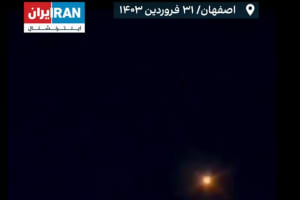Oil prices surge, world leaders call for calm amid fear of escalation following Israeli strike in Iran
Iran seeks to downplay the incident and stop exchanges with Israel

A large number of world leaders warned against an escalation regarding the situation in the Middle East on Friday after Israel struck an Iranian military site in the city of Isfahan earlier in the morning.
Fears of a regional escalation caused oil prices to surge by several percentage points following reports of the Israeli strike, while several markets in Asia dropped and European stock exchanges like the German DAX started trade with significant drops on Friday.
The first official statements from the Iranian regime, as well as news reports by official outlets on Friday, indicated that Iran was seeking to downplay the incident and stop the exchange of blows with Israel for the moment.
European Union member states and Group of Seven (G7) members have already begun a “diplomatic effort” to quell tensions, with the G7 calling for an “absolute de-escalation” in the Middle East, Italian Foreign Minister Antonio Tajani said on the sidelines of a G7 foreign ministers summit on the island of Capri, Italy.
“We call on everyone to be prudent to avoid an escalation in the area,” he said while reiterating Italy’s call for a ceasefire in the Gaza Strip.
President of the European Commission Ursula von der Leyen underscored that it is “absolutely necessary” for the Middle East to stay “stable” and demanded all sides to “refrain from further action.”
“We have to do everything possible that all sides restrain from the escalation in that region,” she said.
Iran’s allies, China and Russia, echoed similar sentiments, urging all parties to show restraint. The Russian Kremlin added that it was still “studying the details” of the incident.
Moscow’s Foreign Minister Sergey Lavrov later said that Russia had told Israel that Iran didn't want to escalate further.
“There have been telephone contacts between the leadership of Russia and Iran, our representatives and the Israelis. We made it very clear in these conversations, we told the Israelis that Iran does not want escalation,” Lavrov said.
“China opposes any actions that further escalate tensions and will continue to play a constructive role to de-escalate the situation,” Chinese Foreign Ministry Spokesman Lin Jian said.
During a press conference in London, British Prime Minister Rishi Sunak repeated his call for “calm heads to prevail,” after using the same phrase in a phone call with Israel’s Prime Minister Benjamin Netanyahu three days prior.
“Significant escalation is not in anyone’s interest,” Sunak said after the reports regarding Israel’s strike in Iran, which Israel hasn’t officially confirmed yet.
He declined to comment further on the reports, stressing that “It’s a developing situation, it wouldn’t be right for me to speculate until the facts become clearer and we’re working to confirm the details together with allies.”
Among Arab nations, Oman, known for its mediation efforts between Iran and Western countries, condemned the “Israeli attack on Isfahan” and denounced “Israel’s repeated military attacks in the region.”
Egypt released a statement saying it was “deeply concerned about an escalation of hostilities between Israel and Iran,” and warned against the “consequences of expanding the conflict and instability in the region.”

The All Israel News Staff is a team of journalists in Israel.
You might also like to read this:
















